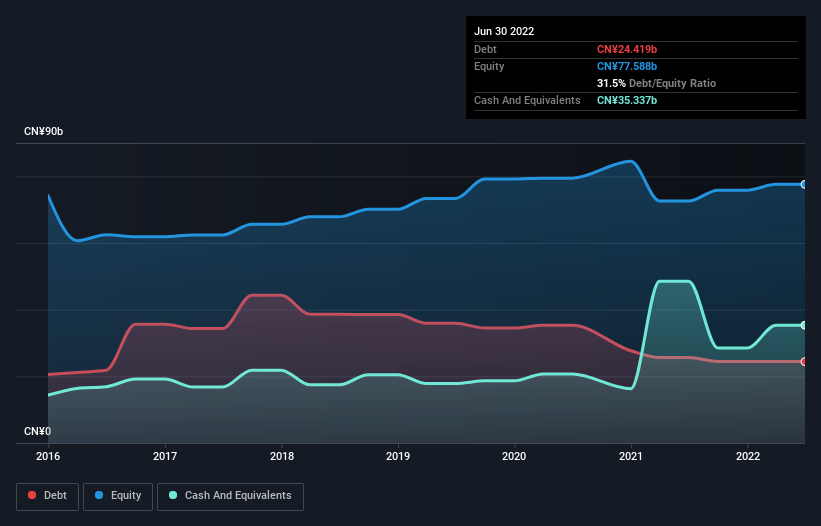
Warren Buffett famously said, 'Volatility is far from synonymous with risk.' So it might be obvious that you need to consider debt, when you think about how risky any given stock is, because too much debt can sink a company. We can see that Kunlun Energy Company Limited (HKG:135) does use debt in its business. But should shareholders be worried about its use of debt?
When Is Debt A Problem?
Generally speaking, debt only becomes a real problem when a company can't easily pay it off, either by raising capital or with its own cash flow. If things get really bad, the lenders can take control of the business. However, a more usual (but still expensive) situation is where a company must dilute shareholders at a cheap share price simply to get debt under control. Of course, the upside of debt is that it often represents cheap capital, especially when it replaces dilution in a company with the ability to reinvest at high rates of return. When we examine debt levels, we first consider both cash and debt levels, together.
Check out our latest analysis for Kunlun Energy
What Is Kunlun Energy's Net Debt?
The image below, which you can click on for greater detail, shows that Kunlun Energy had debt of CN¥24.4b at the end of June 2022, a reduction from CN¥25.6b over a year. However, it does have CN¥35.3b in cash offsetting this, leading to net cash of CN¥10.9b.

How Healthy Is Kunlun Energy's Balance Sheet?
Zooming in on the latest balance sheet data, we can see that Kunlun Energy had liabilities of CN¥34.1b due within 12 months and liabilities of CN¥22.3b due beyond that. On the other hand, it had cash of CN¥35.3b and CN¥3.23b worth of receivables due within a year. So its liabilities outweigh the sum of its cash and (near-term) receivables by CN¥17.8b.
This deficit isn't so bad because Kunlun Energy is worth CN¥43.8b, and thus could probably raise enough capital to shore up its balance sheet, if the need arose. But it's clear that we should definitely closely examine whether it can manage its debt without dilution. While it does have liabilities worth noting, Kunlun Energy also has more cash than debt, so we're pretty confident it can manage its debt safely.
Also positive, Kunlun Energy grew its EBIT by 24% in the last year, and that should make it easier to pay down debt, going forward. There's no doubt that we learn most about debt from the balance sheet. But it is future earnings, more than anything, that will determine Kunlun Energy's ability to maintain a healthy balance sheet going forward. So if you want to see what the professionals think, you might find this free report on analyst profit forecasts to be interesting.
Finally, a company can only pay off debt with cold hard cash, not accounting profits. While Kunlun Energy has net cash on its balance sheet, it's still worth taking a look at its ability to convert earnings before interest and tax (EBIT) to free cash flow, to help us understand how quickly it is building (or eroding) that cash balance. During the last three years, Kunlun Energy generated free cash flow amounting to a very robust 99% of its EBIT, more than we'd expect. That puts it in a very strong position to pay down debt.
Summing Up
While Kunlun Energy does have more liabilities than liquid assets, it also has net cash of CN¥10.9b. And it impressed us with free cash flow of CN¥9.6b, being 99% of its EBIT. So is Kunlun Energy's debt a risk? It doesn't seem so to us. When analysing debt levels, the balance sheet is the obvious place to start. However, not all investment risk resides within the balance sheet - far from it. Case in point: We've spotted 1 warning sign for Kunlun Energy you should be aware of.
Of course, if you're the type of investor who prefers buying stocks without the burden of debt, then don't hesitate to discover our exclusive list of net cash growth stocks, today.
Valuation is complex, but we're here to simplify it.
Discover if Kunlun Energy might be undervalued or overvalued with our detailed analysis, featuring fair value estimates, potential risks, dividends, insider trades, and its financial condition.
Access Free AnalysisHave feedback on this article? Concerned about the content? Get in touch with us directly. Alternatively, email editorial-team (at) simplywallst.com.
This article by Simply Wall St is general in nature. We provide commentary based on historical data and analyst forecasts only using an unbiased methodology and our articles are not intended to be financial advice. It does not constitute a recommendation to buy or sell any stock, and does not take account of your objectives, or your financial situation. We aim to bring you long-term focused analysis driven by fundamental data. Note that our analysis may not factor in the latest price-sensitive company announcements or qualitative material. Simply Wall St has no position in any stocks mentioned.
About SEHK:135
Kunlun Energy
An investment holding company, engages in the exploration, development, production, and sale of crude oil and natural gas.
Flawless balance sheet, good value and pays a dividend.

